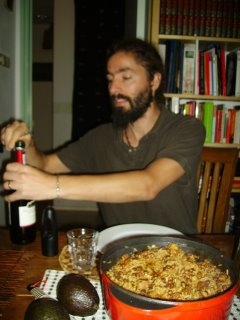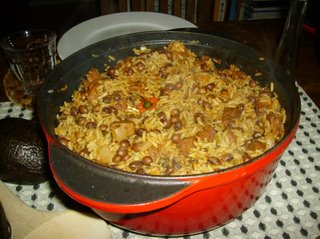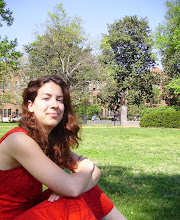 fungal protein. Sounds a bit weird, but actually tastes good. The pelau is of Indian origin (like half of the inhabitants of Trinidad, including writer V.S.Naipaul), though similar dishes exist - pilau, pilaf, etc. - from many Central Asian and Middle Eastern countries. The Caribbean character of pelau consists of the coconut cream, hot peppers and gungo peas (a bean with a nutty flavour). And the use of caramelized brown sugar.
fungal protein. Sounds a bit weird, but actually tastes good. The pelau is of Indian origin (like half of the inhabitants of Trinidad, including writer V.S.Naipaul), though similar dishes exist - pilau, pilaf, etc. - from many Central Asian and Middle Eastern countries. The Caribbean character of pelau consists of the coconut cream, hot peppers and gungo peas (a bean with a nutty flavour). And the use of caramelized brown sugar.It reminds me somewhat of the rice 'n peas from my (11th) Jamaican meal.
I ask Louise what differences there are between Jamaica (my only reference in the Caribbean) and Trinidad. She mentions the fact that the Jamaican men that came to study at her university were always bowled over by the beauty of the (straight-haired Indo-) Trinidadian girls on campus. Louise herself is "easy on the eyes" with her wide smile and stylish dreadlocks, as her husband Douwe (with even longer dreads) must acknowledge. I would never have
 guessed she was a petrochemical engineer, a profession I associate with ambitious young men in suits. But then, what do I know? I've never knowingly met one, Louise is the first. For her job, she has to be away for two-week periods every month, now in a small town in Germany, working on pipelines buried beneath the ocean floor. Too much time separated from Douwe! I'm guessing her parents in Trinidad must miss their three children a lot, as they are all living in Europe at the moment.
guessed she was a petrochemical engineer, a profession I associate with ambitious young men in suits. But then, what do I know? I've never knowingly met one, Louise is the first. For her job, she has to be away for two-week periods every month, now in a small town in Germany, working on pipelines buried beneath the ocean floor. Too much time separated from Douwe! I'm guessing her parents in Trinidad must miss their three children a lot, as they are all living in Europe at the moment.We relive Trini culture by leafing through an illustrated dictionary that includes such phrases as Fresh Water Yankee. The definition is: "A Trini who goes to America and comes back acting and talking Yankee. Originally someone acting Yankee without even going overseas, or crossing salt water." Thus the fresh water reference.
 In an online version I also find: Sucuyant, "A Trini vampire that sheds its human skin and flies at night as a ball of fire, sucking the blood of its victims while they sleep." I wish Louise was here to explain that one for me now!
In an online version I also find: Sucuyant, "A Trini vampire that sheds its human skin and flies at night as a ball of fire, sucking the blood of its victims while they sleep." I wish Louise was here to explain that one for me now!Less menacing is the word maco, meaning a nosy person or a gossip. It's also the name of one of Louise's favorite glossy magazines, filled with peeks into rich Caribbean people's lives. We
 admire the photos of a leafy garden of a stylish house in Curaçao and fantasize about what it would be like sitting on the porch at night. Quickly reality sets in when Douwe realizes: "We would be scratching ourselves like crazy because of all the mosquitoes!"
admire the photos of a leafy garden of a stylish house in Curaçao and fantasize about what it would be like sitting on the porch at night. Quickly reality sets in when Douwe realizes: "We would be scratching ourselves like crazy because of all the mosquitoes!"Oh well, maybe in our ideal Caribbean home, we would need to build a screened porch. In chilly Amsterdam, Douwe and Louise do have some impressive tropical plants, among them a Monstera deliciosa with incredibly glossy leaves. Their trick is dusting them with some kind of silicone gloves...
Feel like more domestic tips?
Click here for Louise's instructions for making Trini Pelau. Chicken or Quorn, you decide.

5 comments:
Hi :) Great post however pelau is not from the Indo-Trinidadian influence. Pelau is solidly rooted in the African (the gungo peas, meat caramelization, the coconut cream) and Spanish parts (all in one casserole) of our national culinary heritage :).
i think its in Trinidad because it has evolved from being influenced by all the creole, french, spanish etc etc and it overlooks the Inidan influence...HOWEVER the word pelau has absolutley no origin in anything besides he Indian pulao, which is rice and vegs and meat etc....exactly like what we call pelau...i think pelau is a french-creole word borrowed from the Inidan 'pulao'...i am very convinced that pelau and the dish that it represents originates in Indian influence. Maybe its not directly influenced in Trinidad from Indian but it influenced the world in varying types of dishes which made its way to T&T as well. Also, there is the local term for a dish kichree which is an local Indian style pelau...which is meat(saltfish) and beans etc etc. All in all the words pelau, paella, pilaf all originate from the Indian 'pulao'...after all when u think of it sanskrit is considered the base of all languages and sanskrit is the oldest known structured language!
please also note that a dish of rice, meat and peas/beans, is a very universal thing! all cultures have some kind of dish that resembles such....India influenced so many thinhs across the continent of Europe, Middle East and Far East and those cultures have influenced the New World...there's so much that can be said about the influence India has on the world....but i am convinced that 'pelau' comes from the Indian 'pulao', 'pulav' etc....the sanskrit word would be 'pulaka'
pelau is derived from the french Pilau which is rice, chicken or meat and beans or peas sometimes veggies. This dish is very popular in parts of france. You know, the french were in Trinidad
Larry, you have come across as so biased it's not even funny.
Post a Comment